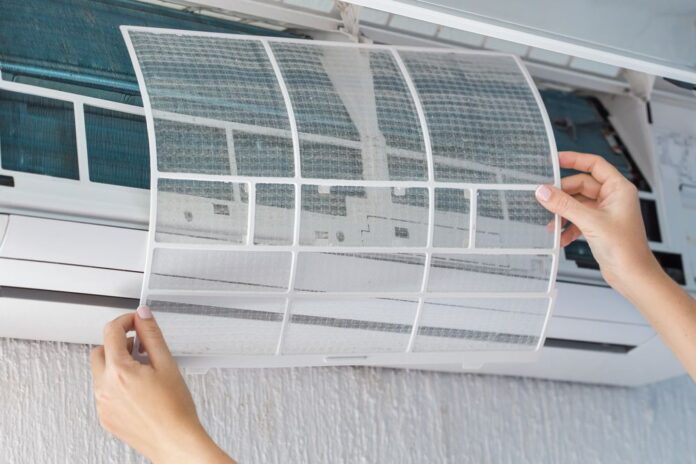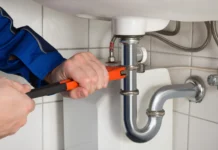Does your AC seem to be running less efficiently than usual? Does every room in your home feel like a sauna? It may be time for you to change the filter in your air conditioning unit! In this blog, we’ll explore how to tell if it’s time for a new filter and how often it should be replaced. From knowing when to switch out your filter to understanding the importance of keeping up with maintenance, you’ll be on top of your air conditioning game in no time!
Reasons Why Your AC Filter Needs to be Changed
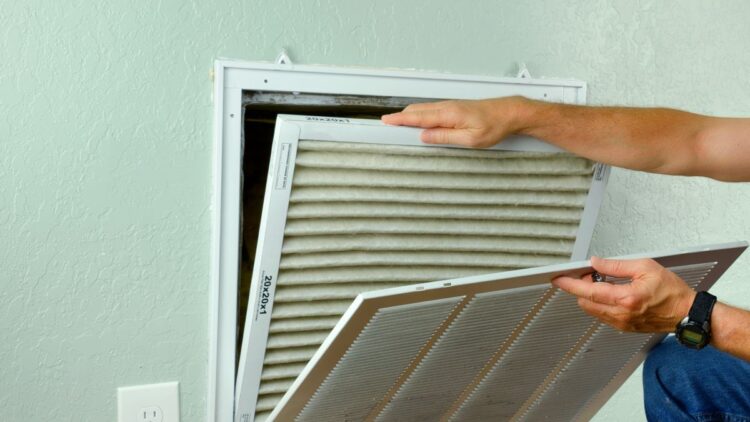
Your air conditioning filter protects your home from dirt and dust particles that can have an impact on air quality, but it also has implications for how efficiently your AC runs. If the filter is excessively clogged, it can reduce airflow and thus limit the efficiency of your system, resulting in higher energy bills.
To ensure that you are getting the most out of your AC unit, here are some signs to watch out for when it comes to changing your AC filter:
- You notice a decrease in air quantity or velocity coming through the vents.
- Your air conditioning system is running longer than usual or cycles on and off frequently.
- Looks dirty or damaged.
- If you experience any type of allergy symptoms related to indoor air quality. Dirt and dust particles get trapped by the filter which can help reduce any negative reactions from these contaminants being circulated throughout your home.
In general, most of them should be changed every 3 months for maximum efficiency and cost-effectiveness, however depending on the region you live in as well as other environmental factors like pets or smokers in your household, this timeline may need to be adjusted accordingly.
Types of AC Filters
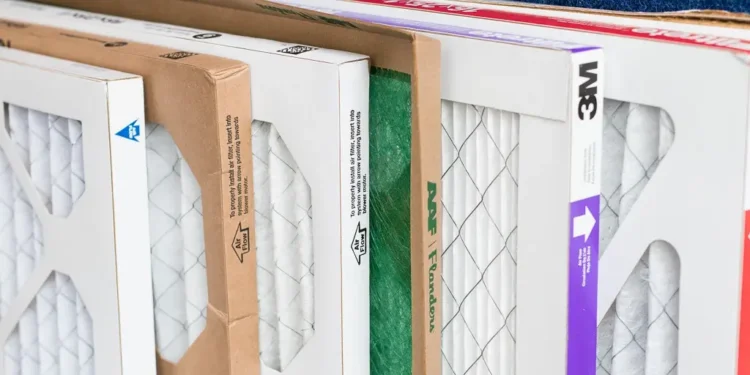
Air conditioning systems require them to clean the air that circulates through the unit. While each AC system varies, there are three main types: disposable fiberglass, pleated paper and washable fabric-covered cardboard. Most manufacturers recommend that you change your filter at least once a month or as frequently as indicated on the filter’s packaging.
- Disposable Fiberglass Filters: These are typically used in central AC systems and are often referred to as “throwaway” filters due to their low price, convenience and easy installation. However, they need to be changed more frequently than other two types in order for them to effectively capture contaminants from the air and help maintain good indoor air quality (since they become clogged rapidly).
- Pleated Paper Filters: These provide a higher level of filtering than the disposable type but also need changing on a regular basis in order for them to perform properly. They feature accordion pleats with media that can trap smaller particles – such as dust mites, mold spores and pet dander – while allowing better airflow than other models.
- Washable Fabric-Covered Cardboard Filters: These need less frequent replacement since they can be washed—about every six months depending on usage—making them significantly more economical over time than disposable ones. Washable fabric-covered cardboard filters offer excellent filtration capabilities while allowing highest levels of airflow among all three designs.
How Often Should You Change Your AC Filter?
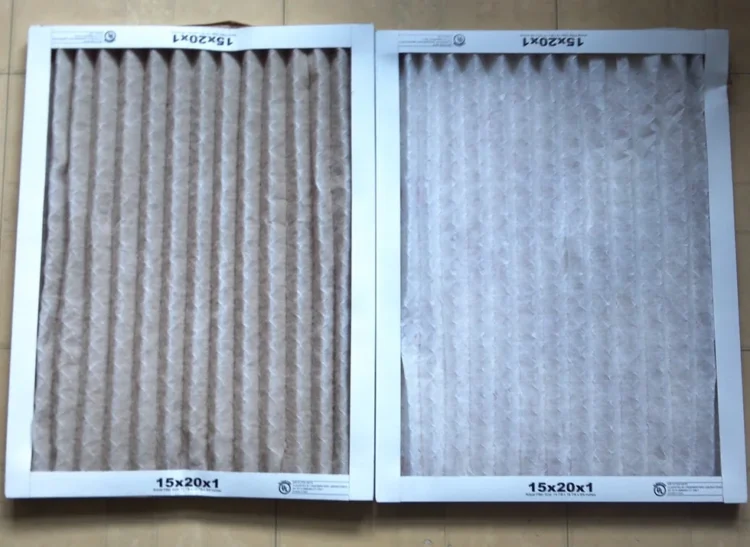
It is important to keep them clean in order to ensure optimum performance and quality of the air in your home. To protect both the efficiency of your AC system and indoor air quality, it is important to know when and how often you should change or clean your filter.
Typically, they should be replaced every three months or when necessary for optimal performance. However, this depends on the type used in your AC unit as well as usage and environment. For instance, if you often have “family members” like pets that have allergens like pet dander that could easily clog them up more quickly than usual, then you may need to change them more frequently (like every one or two months).
To help remember when to change or clean your filter, a good rule-of-thumb is to mark either the date of purchase on it or place further reminders on a calendar. Additionally, if you notice any signs such as unusual odors coming from inside the unit, slow airflow coming out of vents, an increase in energy bills, or noisy operation – these are also signs that it’s time for a new one.
Benefits of Regularly Changing Your AC Filter
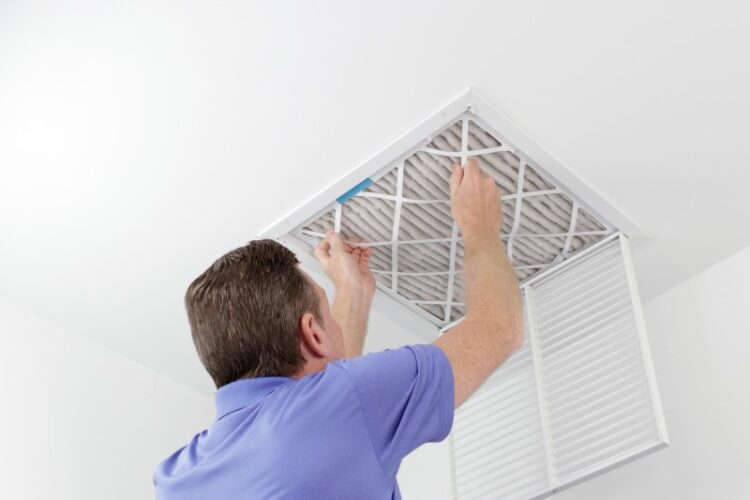
Changing it on a regular basis can have many positive benefits. Your system will operate more efficiently, which means less energy is used to maintain the same level of cooling or heating power. This can lead to cost savings on your utility bills each month. Additionally, regularly changing it also helps to keep your system running smoothly for an extended period of time as accumulated dirt and dust particles often cause system performance issues if left unchecked.
Furthermore, regularly changing it helps to improve the quality of the air that circulates inside of your home, as it traps dirt and other airborne contaminants such as dander, pollen, and mold spores before they have a chance to make their way into the air that you breathe. This helps to limit allergies and other respiratory issues that are triggered by allergens in the home. Additionally, if the air flowing into your house is dirty, you may find that your AC smells musty when it is running.
Finally, changing them will help extend the life of your HVAC system as dirt buildup can cause components such as evaporator coils and fan motors to become worn out prematurely due to excessive heat reaching those parts during operation.
Conclusion
Whether you’re dealing with a traditional 1-inch deep pleated filter, or a more specialized filter that runs in your unit’s return air ducts, it’s important to follow the manufacturer’s recommendations and keep your air filters changed on a regular basis. When properly maintained, your home comfort system will reward you with clean, filtered air and reliable operation.
It is also recommended that you check it at least every few months in order to ensure it is clean and free from any dust or debris that could affect the performance of your system. Many experts suggest putting a reminder on your calendar or smartphone, so that you don’t forget to take care of this important maintenance task! Doing so can go a long way in keeping your heating and cooling system running efficiently for years to come.

